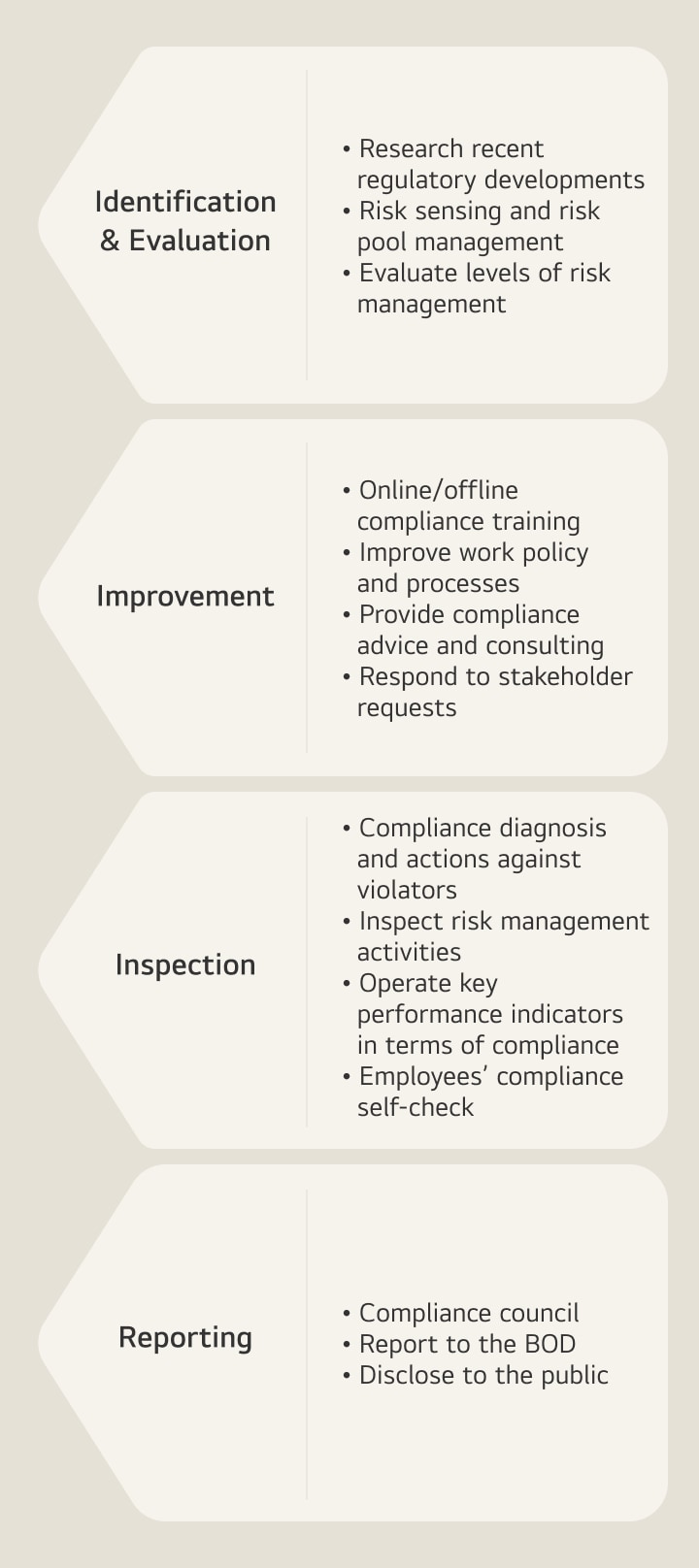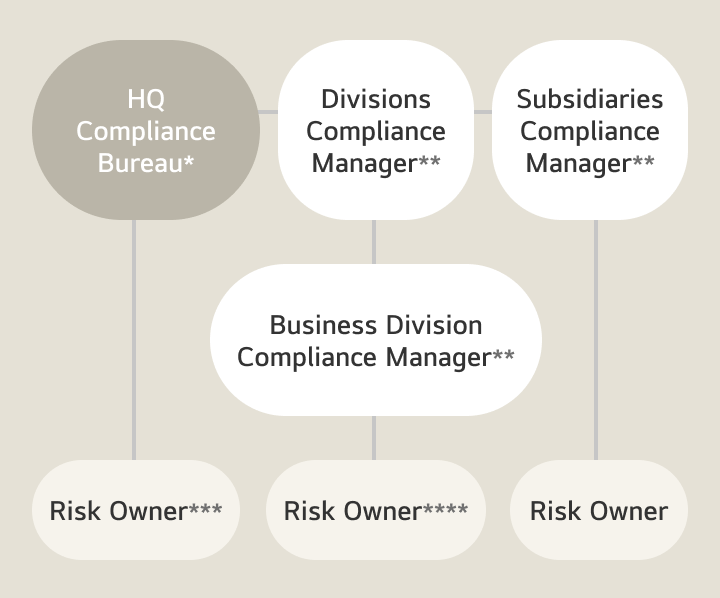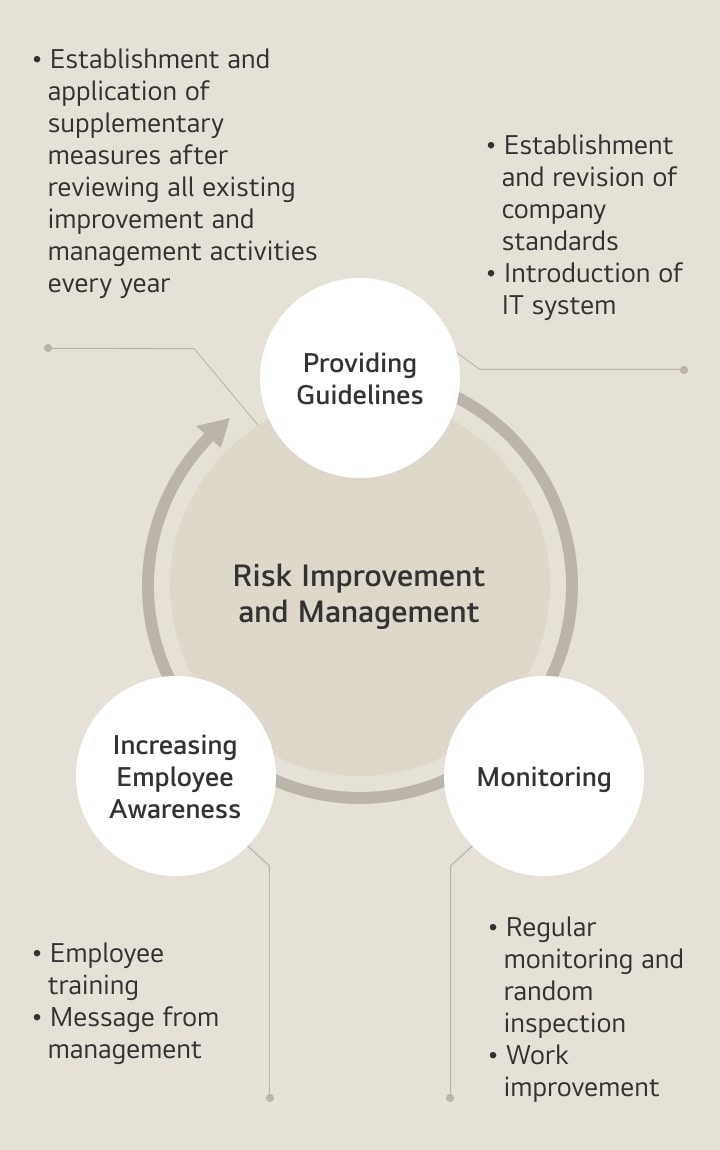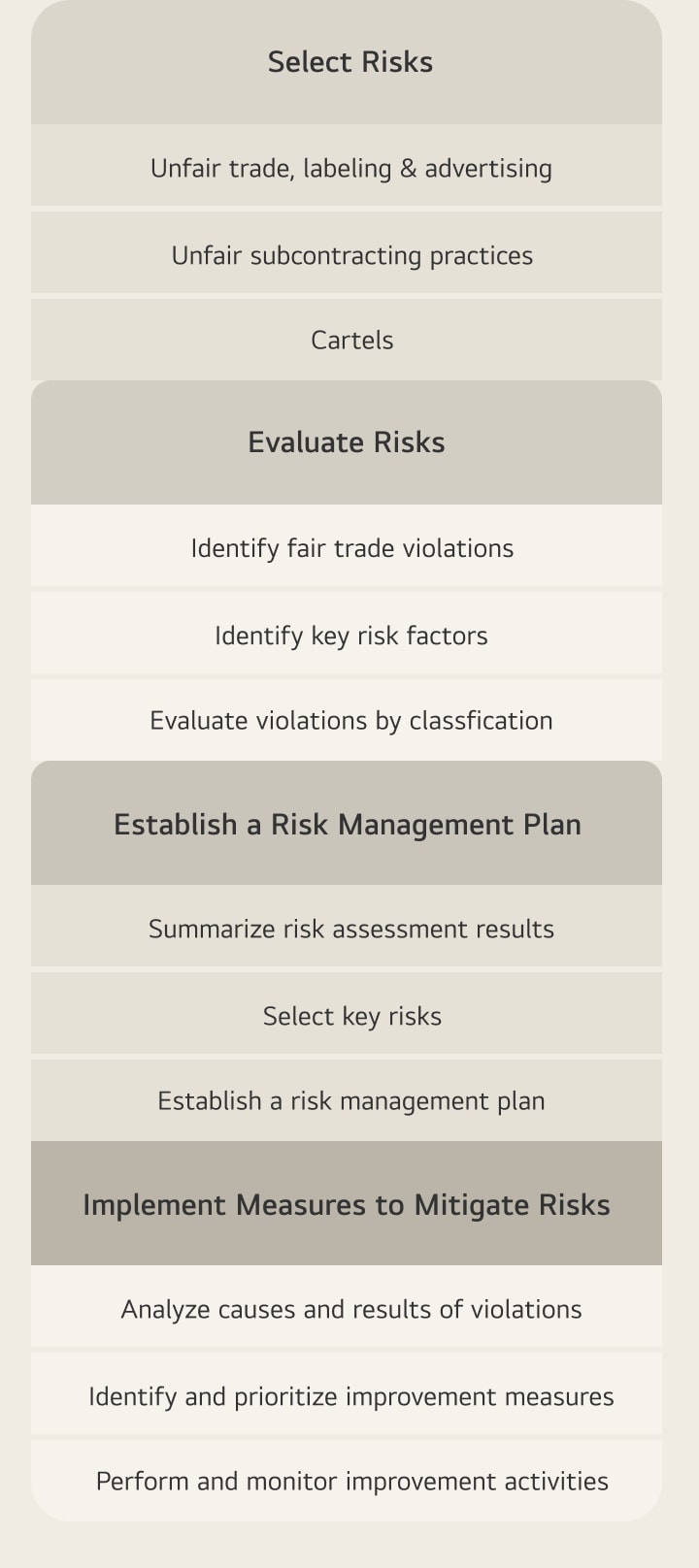We use cookies, including cookies from third parties, to enhance your user experience and the effectiveness of our marketing activities. These cookies are performance, analytics and advertising cookies, please see our Privacy and Cookie policy for further information. If you agree to all of our cookies select “Accept all” or select “Cookie Settings” to see which cookies we use and choose which ones you would like to accept.
Compliance Risk Management
At LGE, we implement compliance management through the establishment of a compliance risk management system and the establishment of relevant organizations, in addition to setting compliance goals and managing performance. We provide various programs to our employees, such as compliance surveys and training, in order to help them internalize compliance management, while operating reporting channels with a view to creating a sound and transparent corporate culture.
Compliance Risk Management System
• We reorganized and reinforced the personnel of the Compliance Bureau operating under the CEO
• Compliance Team: Prevention and mitigation of compliance risks through compliance program design and operation, risk sensing and monitoring
• Compliance Management Team: Legal and policy support including providing advice on global regulatory trends and compliance,
• Compliance Investigation Team: Minimizes the possibility of compliance risks through ongoing and periodic
Goals and Plans for Compliance Risk Management Mid-to Long-Term Goals
• Early identification of compliance risks and establishment of a preemptive response system
• Upgrading compliance coverage and operations
• Continuous improvement of worksite-oriented autonomous management systems
| Mid-to Long-Term Goals |
• Early identification of compliance risks and establishment of a preemptive response system
• Upgrading compliance coverage and operations
• Establishment of worksite-oriened autonomous management systems
| Implementation Plans |
• Strengthening of monitoring and responses to internal and external issues such as laws and regulations, international standards, and stakeholder requirements.
• Evaluation of performance in terms of on-site risk mitigation and customized compliance consulting.
Compliance Program Cycle
Compliance Risk Management Organization
* Manages compliance matters at the company level
** Operates and supports compliance programs for relevant organizations
*** Responsible for managing corporate risks prioritized on a company-wide level
**** Responsible for managing risks of relevant organizations
Compliance Self-Check Surveys
• Employees voluntarily check their level of compliance in terms of risks that are prioritized on a company-wide level
- bribery, discrimination, sexual harassment, personal information, competitive information, collusion through contacting competitors, intellectual property rights, insider trading, advertising, quality
As of 2023
| Division | all | Korea | Overseas |
|---|---|---|---|
| Survey targets | 45,244 | 25,821 | 19,423 |
| Survey participants | 44,440 | 25,336 | 19,104 |
Provision of Customized Online Compliance Training
Results of Online Compliance Education
Category | Subcategory | 2021 | 2022 | 2023 |
|---|---|---|---|---|
| Online training - Korea | Training targets | 28,451 | 25,827 | 25,821 |
| Online training - Korea | Training participants | 26,868 | 24,731 | 25,336 |
| Online training - overseas | Training targets | 18,921 | 19,325 | 19,423 |
| Online training - overseas | Training participants | 17,651 | 18,438 | 19,104 |
| Online training - total | Training targets | 47,372 | 45,152 | 45,244 |
| Online training - total | Training participants | 44,519 | 43,169 | 44,440 |
Offline Compliance Training Courses
| Classification | 2021 | 2022 | 2023 |
|---|---|---|---|
| Training for new team managers | 116(2) | 208(1) | 303(3) |
| Leadership training for expatriate employees | 196(5) | 126(5) | 135(3) |
| Training for new entrepreneurs | 42(1) | 24(2) | 127(1) |
| Onboarding training for expatriate management staff | 30(2) | 29(1) | 24(2) |
Operation of Compliance Reporting Channel
• An integrated hotline operated through LG Group’s online complaints system (http://ethics.lg.co.kr)
- Reporting corruption, illegal acts, acceptance of money or favors, entertainment and wining and dining, and sexual harassment
- Types of report: accepting gifts from stakeholders, improper equity participation in the companies of suppliers, lack of transparency in supplier selection, Illegal/unfair use of company assets, manipulation of documents/numbers, and false reporting, etc.
Provision and Company-Wide Dissemination of Legal Advice
• Analyze major domestic and international laws and regulations in order to provide compliance advice and business guides
• Frequently monitor the status of the enactment and revision of laws, share notes on major issues, and hold briefing sessions
Strengthening of anti-corruption compliance activities
• All employees conduct business in a fair and transparent manner in accordance with the relevant principles and standards.
Moreover, any corruption related to acquiring or maintaining business by illegal means, such as bribery, is prohibited.
• Efforts to raise anti-corruption awareness among employees and prevent violations of related laws and regulations are as follows:
- Conducting voluntary assessments of risk likelihood and impact at each place of business
- Conducting voluntary inspections of employees' compliance with the relevant codes of conduct
- Online training for all employees and collection of pledges outlining employees’ commitment to practicing compliance
Compliance Committee
• Reinforce the leader's commitment to compliance and promote a culture of compliance within the organization
• Review major legal regulations and sanctions by country and discuss practical issues and risks in the field
• Establish an annual compliance risk improvement activity plan for worksites through the compliance committee and occasionally share progress
Fair Trade Compliance
• Build a strong sense of trust with customers and suppliers through fair competition and transactions
• Prevent monetary and non-monetary losses, reputational damage, and a decrease in corporate credit rating, through establishment of a fair trade culture
Fair trade compliance program
• We undertake periodic activities aimed at raising the awareness of our employees in terms of cartels, unfair trade practices, unfair labeling and advertising, and unfair subcontracting practices
• We look out for legal risks via follow-up monitoring
Fair trade risk assessment and management
Inspection and Management of Fair Trade Risks
Eradication of unfair trade and unfair labeling and advertising
• We execute business activities following a preliminary review by the relevant departments in accordance with the enactment and amendment of laws and changes in the business environment
• We examine corporate systems in accordance with the guidelines of the relevant departments in an effort to prevent unfair trade practices
• We thoroughly review labelling and advertising from the product planning and R&D stages to the final stage when advertising is exposed to the public, through our legal system and by working in cooperation with the relevant departments including legal affairs
• We conduct improvement activities such as frequent inspection and follow-up monitoring of labelling and advertising to identify if there is anything that consumers may mistake as unfair labelling or advertising
Pursuit of fair subcontracting practices
• We pursue fair subcontracting practices in order to achieve win-win growth with our suppliers through mutual cooperation
• In order to ensure fairness and transparency in subcontracting transactions, we provide education on related laws and regulations, check the status of and improve subcontracting practices, and implement new systems, etc.
• In order to protect the technologies of our suppliers, we engage in improvement activities such as implementing a supplier data request system and enacting joint development contracts
Cartel Prevention
• Contact with competitors is prohibited in order to prevent the formation of cartel
• In unavoidable cases, employees are permitted to contact competitors after a prior report is submitted
• Implementation of internal control procedure for preventing the formation of cartels
- Improvements and training in line with enactment and amendment of laws, changes in the business environment
- Monitor through our system
- Self-administered surveys conducted by heads of organizations prone to cartel formation
- On-site inspection without prior notice, etc.



